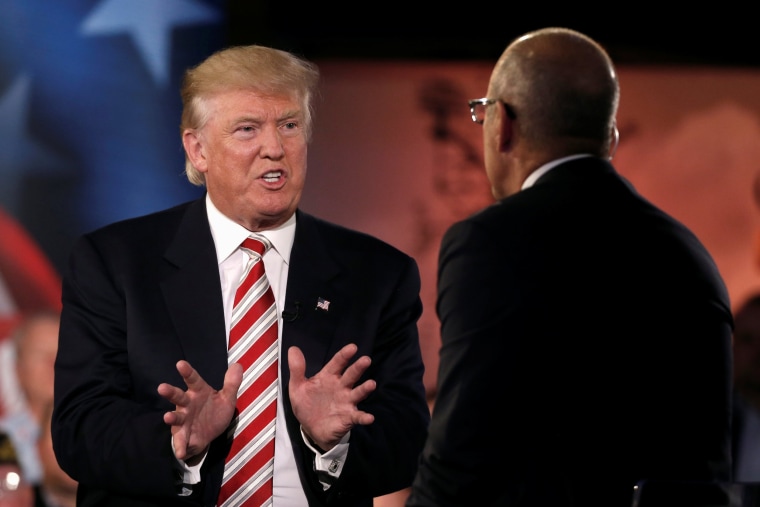At Wednesday night’s Commander-In-Chief Forum, Republican presidential candidate Donald Trump said that the United States should "take the oil" out of Iraq, an idea he's expressed before for that war-torn country and other conflict zones.
But it's a policy that would be "a radical shift in direction," experts say, and even one a retired member of the military who endorsed Trump discounted the idea.
“We go in, we spent $3 trillion. We lose thousands and thousands of lives, and then look, what happens is we get nothing. You know, it used to be the victor belong the spoils,” Trump told NBC News' Matt Lauer. “Now, there was no victor there, believe me. There was no victory. But I always said, take the oil.”
His challenger, Democratic presidential nominee Hillary Clinton, criticized Trump Thursday morning, saying the United States "does not invade other countries to plunder and pillage."
Trump stands alone on this specific war policy, even within his party. It's not a policy that has been endorsed, and even one of his supporters said is a bad idea.
Retired Major General Sidney Shachnow, who organized a letter of 88 retired members of the military in support of Trump, which Trump boasted about multiple times during the forum, said taking another country's oil is "possible" but not smart.
“It sets a bad precedent," Shachnow said in a telephone interview. "And second, that oil belongs to somebody else."
Shachnow correctly pointed out that the U.S. involvement in the first Gulf War stemmed from former Iraqi President Saddam Hussein's attempt to seize control of oil fields in Kuwait.
"We took a stand," he noted.
This is not the first time that Trump has proposed taking oil from conflict zones like Iraq, Libya and Syria.
Early in the Republican primary, Trump often repeated the idea at debates and during television interviews, including a February debate in South Carolina when he said, “I also said, by the way, four years ago, three years ago, attack the oil. Take the wealth away; attack the oil and keep the oil.”
David Mack, scholar with the Middle East Institute and former ambassador to the United Aram Emirates, said the idea smacks of “colonialism and imperialism.”
“They are not about to stand for a foreign power coming in and seizing their resources and keeping them,” he added. “When I heard this last night, it took my breath away.”
Mack said he was on the Iraq Study Group in 2006, led by former Sec. of State Howard Baker and former U.S. Rep. Lee Hamilton, to provide recommendations on how to best solve the Iraq quagmire.
“We looked at a lot of plans, and, let me be blunt, this was not one of them,” he said.
The U.S. invasion of Iraq led critics on the left to accuse the Bush administration of entering Iraq because of Iraq’s rich oil fields, which are the second largest in the world. That concern was elevated with former Vice President Dick Cheney's ties to the oil industry and after Deputy Defense Secretary Pau Wolfowitz once said the Iraq War would not be too burdensome because Iraq’s oil would “self-finance” the effort, especially reconstruction. But the U.S. never benefited from Iraq's oil.
Jan Kalicki, a global fellow at the Wilson Center, said that aside from the geopolitical ramifications the U.S. would incur by "violating" another country’s sovereignty, he said the amount of U.S. resources such an endeavor would take are “unrealistic.”
“To actually take the oil, we’d have to have a very substantial military presence in the country,” he said.
“He comes out with these statements but doesn’t really think about the consequences and doesn’t take into account our own security,” Kalicki added.
Shachnow, the retired military leader who endorsed Trump, said Americans are smart enough to understand when a policy is a bad idea.
“Everything you hear from Hillary Clinton or Donald Trump you have to take with a grain of salt,” he said.

